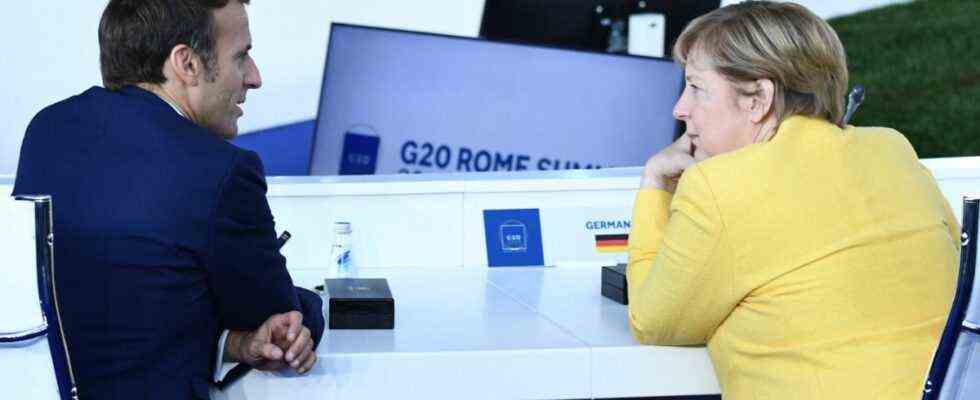French President Emmanuel Macron attaches great importance to an appropriate setting when he receives Germany’s Chancellor on a farewell visit this Wednesday. It should take place in a city “where historical monuments and wine culture illustrate the richness of French heritage”. The choice fell on the town of Beaune in Burgundy, where he will award Angela Merkel the Grand Cross of the Legion of Honor, France’s highest order.
It will be a high mass for Franco-German relations with a historical footnote: François Mitterrand received Helmut Kohl here in 1993 for the Franco-German summit; the two strolled through the alleys of the old town. But looking at the coalition negotiations in Berlin, Paris also has expectations of Merkel’s likely successor, Olaf Scholz, and a traffic light coalition led by him.
The Social Democrat was seen by some as the ideal successor to the Élysées in the Chancellery. Nevertheless, there are some issues on which Paris is hoping for a quick clarification of the German positions with a view to France’s upcoming EU Council Presidency in the first half of the coming year – and areas of friction are already emerging here and there.
When Mitterrand and Kohl discussed the “European defense and security identity within the framework of the European Union”, which they wanted to develop further as a contribution to strengthening the European pillar of NATO, the EU, led by France, wants to adopt its “strategic compass”. It is clear that Macron would like the Europeans to be more independent and independent from the USA. He sees confirmation of his stance in the chaotic withdrawal from Afghanistan, as well as in the Aukus Indo-Pacific security pact that US President Joe Biden signed with Australia and Great Britain – it also costs France a billion dollar deal in submarines for Australia.
France wants to arm the EU – with the German Greens?
From a French perspective, greater capacity to act means that Europe must continue to rearm. It is true that Paris does not constantly publicly recall NATO’s two percent target for defense spending. French diplomats point out, however, that NATO has also decided on a second goal, namely to invest 20 percent of the budget for the procurement of new large-scale equipment. The Americans have no objection to this either. However, it is questionable whether a traffic light coalition will allow spending on armaments projects to continue to grow at the current level – and which projects it is committed to.
Given its political importance, France assumes that a new federal government will not call into question the most important and most expensive joint venture: the development of a next-generation fighter aircraft system (FCAS). As with the planned project of a new battle tank, the Parisians do not consider it realistic to refinance the costs in the domestic market alone – exports to countries outside the EU and NATO are considered essential in order to make the projects economically viable. In its election manifesto, the SPD described a restrictive arms export policy vis-à-vis third countries as “central”, while the Greens advocated “joint restrictive arms export control by the EU”.
Another long-cherished wish in Paris is a reform of the European Stability and Growth Pact. The EU Commission is to present proposals for this in the spring. However, reaching a conclusion under the French Council Presidency is considered extremely ambitious. On the one hand, the FDP makes it clear that it has little sympathy for softening the debt rules – more complex solutions are likely to be at stake. In addition, because of the presidential election on April 10 (and April 24) and the subsequent election to the National Assembly in mid-June, France has to work through its agenda by mid-March – the president and government employees are each subject to restrictions on public appearances four weeks in advance.
France’s demand that the EU Commission put atomic energy on the list of climate-friendly energies and thus classify investments as sustainable is met with resistance, especially from the Greens. France has Eastern European member states at its side in particular. Commission head Ursula von der Leyen has now announced – with Merkel’s approval – that she will present a proposal in November that could also favor gas. In France, the issue of energy prices is extremely sensitive – a resurgence of the yellow vests is the last thing Macron needs in the election campaign.

